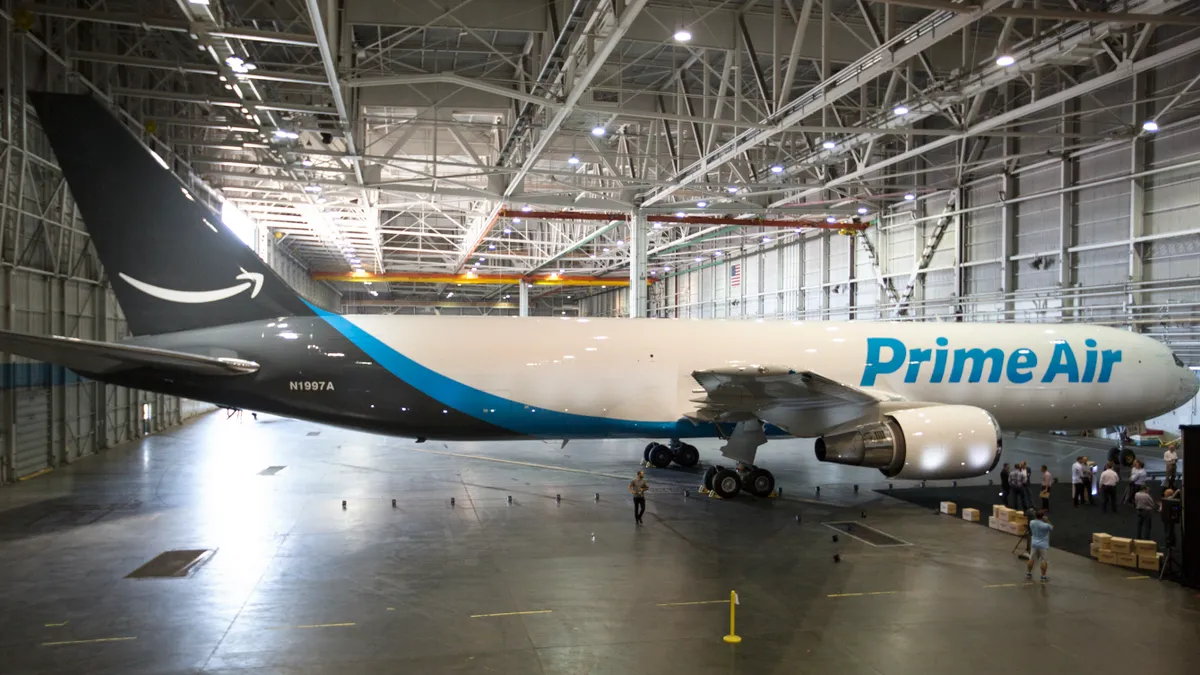Dive Brief:
-
More than 50 cargo pilots who fly for Amazon Prime Air, from Atlas Air and Air Transport Services Group, will gather outside of Amazon's annual shareholder meeting Tuesday to alert investors about the intensifying challenges at their airlines and the potential risks for Amazon’s growing logistics operations, according to a press release emailed to Retail Dive from the Airline Professionals Association, Teamsters Local 1224 representing pilots and flight crewmembers from 11 airlines.
-
Earlier, in a letter to Amazon's board of directors, International Brotherhood of Teamsters General Secretary-Treasurer Ken Hall warned that a tightening pilot supply and looming operational risks at Amazon’s cargo contractors should concern board members. It encouraged the company to work with pilots and the union, according to the press release and a report from CNBC. An internal Atlas report found that 92 of its pilots have quit so far this year, double the number from last year, for jobs at UPS and others with better pay and benefits, according to CBNC.
-
In November, about 250 pilots flying for a subsidiary of airplane leasing company Air Transport Services Group went on strike and refused to fly scheduled routes for Amazon and global shipper DHL. They were protesting staffing shortages resulting in too many emergency runs, precluding time off in violation of their contracts. In February, ATSG pilots reached a settlement with the airline that re-instated pilots’ right to take compensatory days off.
Dive Insight:
The pilots' consternation over pay and working conditions reveals Amazon’s vulnerability to the kinds of issues normally reserved for shipping companies like UPS, FedEx or DHL. In March 2016, Amazon bought a 9.9% stake in ATSG, based in Wilmington, OH, and the e-commerce giant’s fulfillment unit, Amazon Fulfillment, said then that it's leasing 20 Boeing 767s from ATSG to improve delivery operations. Their November strike came at the start of a holiday season in which delivery companies were anticipating record e-commerce sales.
“Amazon is at the heart of our carriers’ vision for the future and that’s why it’s our responsibility as pilots to alert shareholders about the underlying issues at our airlines that could spell trouble for our relationship,” First Officer Marvin Tate, an Atlas Air pilot who has flown for the company for two years, said in a statement emailed to Retail Dive. “AAWW has made huge commitments to Amazon even though we’re losing dozens of pilots a month and are not able to replace them. We urge Amazon investors and executives to heed the voices of those on the frontlines, and encourage its contracted carriers to help build a successful partnership that works for customers, pilots and our businesses alike.”
It's not the first time the pilots have voiced concern to the company beyond their work stoppage and union activities. In December, they established a website and a series of social media ads explaining directly to Prime customers why they went on strike in November, according to a press release from the International Brotherhood of Teamsters Local Union 1224. The union says that air carrier contractors Atlas Air WW and Air Transport Services Group (and its ABX Air subsidiary) “overcommitted their operations by taking on Amazon’s business,” according to an ad. “They took on the work despite known staffing problems, and the problems are getting worse,” the pilots warned.
The retailer is "confident in our ability to serve customers," Amazon spokesperson Kelly Cheeseman told Retail Dive then, adding that the e-commerce giant had "re-balanced capacity across our network of carrier partners to ensure there are no disruptions through the busy holiday season, and this rebalancing remains in effect."
Last August, to great fanfare, Amazon revealed its first Prime Air-branded cargo aircraft in an inaugural flight during Seattle’s annual Seafair Air Show. The Boeing 767-300, dubbed Amazon One, is one of 11 planes flying for Amazon through air cargo partners Atlas Air and ATSG in conjunction with the e-retail giant’s ambitious logistics and fulfillment efforts. Amazon said then that the Prime Air transportation network will expand to 40 leased planes over the coming months.
The expense and complexity of e-commerce fulfillment continues to dog e-commerce operations, and not just at Amazon (which saw such costs outpace sales at one point last year). Analysts are increasingly taking into account the damage that the shift to e-commerce is inflicting on retailers’ margins. In addition to tepid sales overall, “the shift to the variable-cost model of e-commerce from the fixed-cost store model continues to suppress operating margins for the sector,” Moody’s Investors Services retail analysts said in a report on U.S. department stores emailed to Retail Dive last week.










